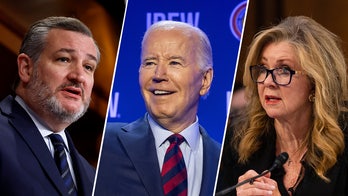
Sen. Blanche Lincoln, Rand Paul, and Sen. Arlen Specter are three of the candidates facing primary challenges in May. (AP)
A Super Tuesday of sorts is coming in six weeks when voters will go to the polls in three potential bellwether states, offering a preview of the pivotal midterm elections in November in which Democrats hope to fend off a Republican surge to regain control of Congress.
This election cycle has perplexed pollsters in a year marked by a brutal fight over health care overhaul, the rise of the Tea Party Movement and the continued descent of record-low job ratings for members of Congress.
But the three primary races on May 18 in Arkansas, Kentucky and Pennsylvania could reflect the mood of the nation toward establishment candidates and insurgent challengers, political strategists say.
Voters will also cast ballots in five other states in the month of May: Indiana, North Carolina, Ohio, Nebraska, and Idaho.
Candidates backed by their political parties typically have the money, the endorsements and the name recognition to stomp the challengers. But political strategists say voters who are angry with Washington can send a clear message to incumbents if the establishment candidates are defeated in the the May elections.
"The message incumbents are going to take is that 'we're all in this for ourselves. We've got to do what we can to save ourselves,'" said GOP strategist David Avella, executive director of GOPAC, a Republican state and local political training organization.
"And it probably means that less Democrats are going to look for the president to come campaign for them," he said.
Democratic strategist Richard Goodstein said if the establishment candidates lose, "then the reaction to Scott Brown will be multiplied by 10."
"Which is 'Incumbent watch your back!'" he said, referring to the come-from-behind Republican candidate who won Ted Kennedy's old seat in the Senate.
Here is a closer look at the three primaries.
Arkansas
The Democratic Senate primary is the one to watch here. Incumbent moderate Sen. Blanche Lincoln is running for re-election against Lt. Gov. Bill Halter. Lincoln has seen her numbers plummet over the last year as she tried to take a moderate tone on health care -- which has given Halter a good attack point with his liberal base and a good fundraising hook from liberal interest groups.
"A moderate Democrat is the only chance that Democrats have for holding that seat," Goodstein said. "I think a liberal Democrat has no chance."
Avella said: "In Arkansas, a state that has a much more conservative... voter base, Halter has to energize and fill the Democrat primary with those Democrats who are most like what I would offer as Washington or national Democrats."
Kentucky
In the Bluegrass state, it's the GOP Senate race that's getting all the attention. Secretary of State Trey Grayson is running against Rand Paul in an open-seat primary. Grayson has the backing of the party establishment, including Senate Minority Leader and fellow Kentuckian Mitch McConnell.
Paul has never run for office and pushes his "outsider" status while still using the fundraising resources of his father Rep. Ron Paul, R-Texas. The two are tied in many polls and if Paul pulls it out, it will be considered a major coup for the Tea Party Movement, which has thrown some support his way.
Goodstein predicts Democrats will win the seat in November.
"Kentucky is a classic case where thanks to the energy from the Tea Party crowd and the more conservative parts of the Republican Party, there could end up being a Republican nominee who is deemed more vulnerable in the general election than the kind of party [-backed and] Sen. McConnell- backed candidate, Grayson," he said.
But Avella picks Republicans to maintain the seat.
"Do Republicans look elsewhere if Rand Paul wins? Actually, no," he said. "I think we continue to look at Kentucky, it's a seat we need to hold. It's one we should hold."
Pennsylvania
Pennsylvania's Democratic primary for U.S. Senate has an even bigger twist with a former long-time Republican senator taking on a current House Democrat.
This will be Sen. Arlen Specter's first time facing voters since he switched parties a year ago, facing off against Rep. Joe Sestak. Specter has the support of the national Democrats, including the president, but is facing an electorate who's known him as a Republican for decades.
Goodstein called the race a "dog fight" that Specter will likely win.
"Pennsylvanians know Arlen Specter very, very well over the years. He's done an awful lot for the state," he said. "And the question is whether the party switch is something that Democrats can kind of warm up to. And I think having the backing of President Obama, Vice President Biden, and Gov. Rendell and so forth probably is likely to be enough for Sen. Specter to hold on to the Democratic nomination."
Avella offered Sestak some strategy advice.
"Sestak in Pennsylvania has to convince voters -- Democrat voters -- that Specter is not trustworthy and that while he is with them today he may not be there a year from now. He may not be there two years from now. He may not be there four years from now."
Fox News' Lee Ross contributed to this report.




